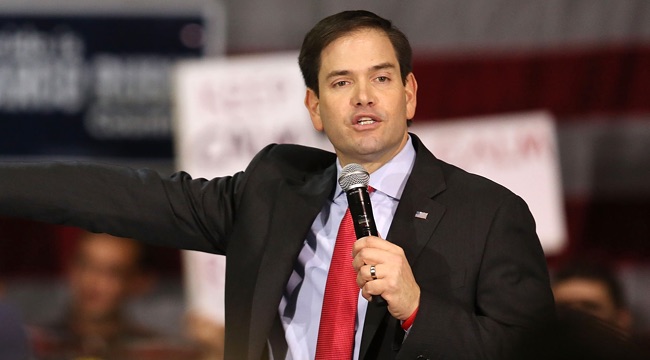
In mid-March, Marco Rubio left the presidential race with a final kick from Donald Trump after losing his home state of Florida. He’s been around, most recently on Wednesday, when he clarified comments about Ted Cruz. Rubio had casually mentioned how only Cruz “fits the criteria” for president, but he wanted to make sure no one misinterpreted that as an endorsement. This Republican race is uncomfortable in that way, for politicians are hilariously dancing around their preferences, lest they make the mistake of influencing a huge swath of voters. He also reminded the press that he won’t be anyone’s vice presidential candidate, and he intends on finishing this senate term and becoming a private citizen. We’ll see how that goes.
Since Rubio’s departure, there’s been some debate on what will happen with the 173 delegates he captured. Some states will allow these delegates to fly elsewhere while others require delegates to stay bound to the withdrawn candidate. In late March, Rubio pulled an unprecedented tactic by refusing to allow his delegates to be released. This was interpreted as an effort to stall Trump’s march to the nomination, but unfortunately, folks seized on how Rubio misspelled “United States” in his letter to Alaska. Was this intentional? The states are awfully “untied” right now.
.@marcorubio making unprecedented bid to keep his GOP delegates for a contested convention https://t.co/MjDdzRC5MB pic.twitter.com/22iJ2Cmt1l
— NBC News (@NBCNews) March 30, 2016
Rubio earned 10 percent of the delegates at play before he dropped out, so his move was not insignificant. Trump and Ted Cruz (and perhaps John Kasich) could gain a substantial advantage by wooing these delegates. And that’s exactly what will happen with 37 of them. The first ballot will see newly freed Rubio delegates coming out of Louisiana, Oklahoma, and Minnesota. The existing rules of the state allow this to happen, and the legislatures are cool with it. NBC says Cruz is working hard to gather these delegates up:
Cruz supporters are currently running for Rubio spots in Minnesota, and last weekend, Cruz won new delegates at local conventions in Oklahoma. During that effort, the Texas senator’s allies filled a Rubio slot with Robert Carter, a minister from Grove, Oklahoma who backs Cruz. “We are pleased at the response that the Rubio contingents at state conventions and congressional delegate selection events are showing our campaign,” a senior Cruz adviser said.
The Cruz campaign’s tactics including persuading delegates that their man will echo Rubio values far more than Trump, which isn’t a very hard sell to make. Will this stop Trump from capturing 1237 delegates? If Cruz continues to out-maneuver his main rival, there’s a possibility that these extra delegates will make a huge difference. And there’s a crafty tactic at work. Cruz is not actually asking these unbound delegates to choose him. He’s simply phrasing it as a request to hold off on Trump:
The maneuvering reveals Cruz’s two-step strategy for a convention: first, denying Trump the nomination on the first ballot by blocking him from unbound delegates; then consolidating the anti-Trump vote on later ballots.
It is the political equivalent of Owen Wilson’s plea in the final scene of the 2005 film Wedding Crashers. Wilson’s character barges into a wedding, quiets the room, and tells his crush, “I’m not standing here asking you to marry me — I’m just asking you not to marry him!”
The tactic worked in a bro-ish rom-com, but will it work for the GOP nomination? There’s still the chance that Trump will try to woo these unbound delegates by trotting out some Trump steaks.
(Via NBC News)
